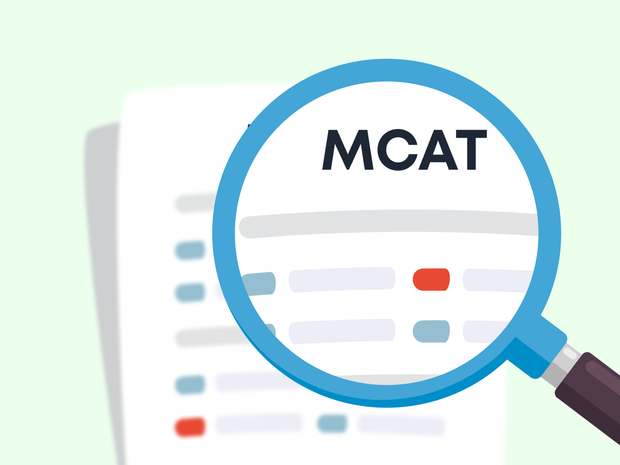It might be tempting to think that you know everything about how the MCAT is scored. Each of the four multiple-choice sections on the MCAT is given a score between 118 and 132, and those are added directly to yield a composite score of between 472 and 528.
Putting the weirdness of these numbers aside, it doesn’t seem like there’s much more to it than that. But if you stop and think about it, you might start to wonder:
- Why does the AAMC equate the MCAT score range?
- How are the MCAT scores scaled?
- How do average MCAT scores on my test date affect my score?
- What are percentile MCAT scores?
- Why is the MCAT scored this way?
- What is a good MCAT score?
- Should I retake the MCAT to improve my score?
- Is every question on the MCAT worth the same amount?
- How can I improve my MCAT scores?
As the brains behind the world’s smartest flashcard app, and a comprehensive collection of digital flashcards for the MCAT, Brainscape and our MCAT expert partner, Clara Gillan (who scored a stratospheric 526 on the exam), are more than just a little familiar with these questions.
In fact, Clara routinely thinks way too much about the nuances of MCAT scoring. So, with our powers combined, it’s time to clear up the many score-related misconceptions that float around in the MCAT universe.
Let’s get started …
Why Does the AAMC Equate the MCAT Score Range?
A given MCAT test date is termed an “administration,” and one exam administration or test date includes test-takers from every location where the MCAT is offered. Here’s the kicker: Not everyone on the same test date gets the same exam! In fact, not everyone in the same testing center on the same test date gets the same exam.
Instead, the Association of American Medical Colleges or AAMC (the examiners) creates the MCAT in many different versions, called “test forms.” These forms might be entirely different, or they might differ only slightly; we can’t be sure of the specifics, because the AAMC keeps this information very close to the vest. But we can still gather two main takeaways from the existence of these test forms.
First, if you’re the type of person who likes to commiserate online after a test—within the AAMC’s guidelines, of course—you should be aware that not everyone you’re talking to even took the same test.
Second, the AAMC must have some process by which they figure out which test forms were harder or easier than others and account for this in their scoring. This is why the MCAT scores are equated: so that everyone’s results reflect the relative difficulty or ease of the exam they took.
In other words: equating ensures fairness.
How are the MCAT Scores Scaled?
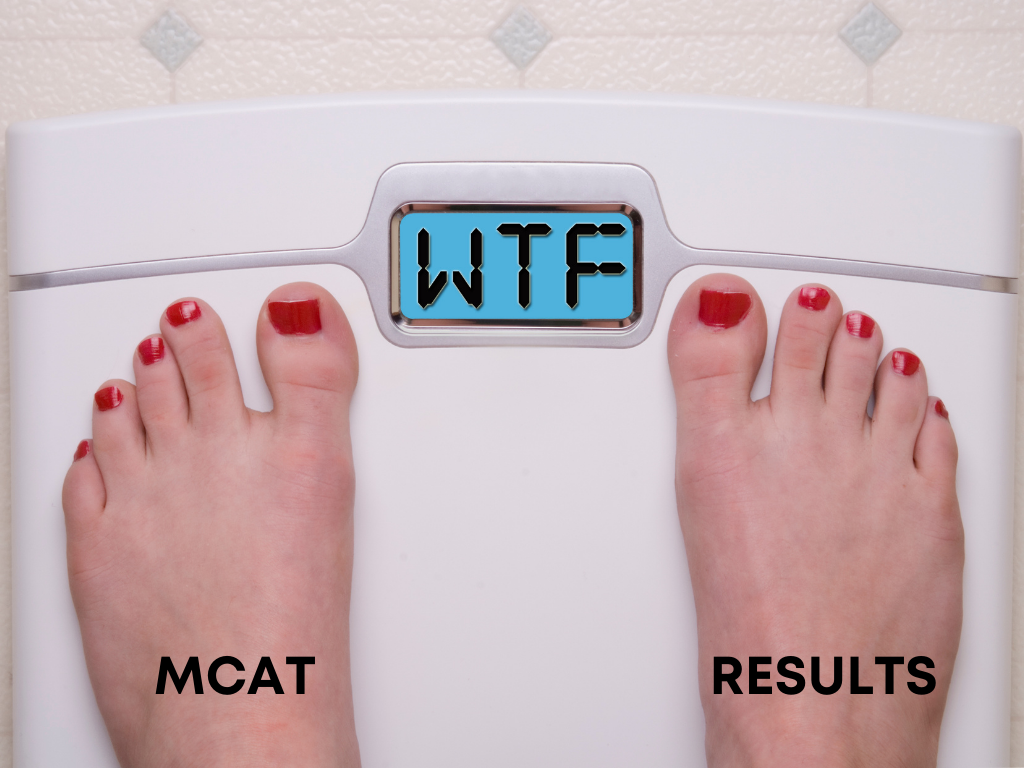
To understand the basics of how this works, let’s consider the AAMC MCAT practice tests as an example. Don’t worry if you haven’t taken those yet; we won’t reveal any specifics!
On a practice test—and on the real thing—the number of questions you answer correctly in each section is termed your raw score. So, for example, if you got 47 questions correct out of 59 for a science section, your raw score is 47/59. The AAMC then takes that value and converts it to a scaled score, which falls in that 118 to 132 MCAT score range that I mentioned earlier.
Now, if you get exactly 47 questions correct on, say, the chemistry/physics section for every AAMC full-length practice exam you take, you’ll notice that you won’t always get the same scaled MCAT scores. This is because the AAMC practice tests have already been equated.
The test-makers know, from data gathered from thousands of students, that as much as they might have tried to make the exams equal in difficulty, some sections are just going to be harder on certain exams. Individual scales are devised for each section to account for this variation.
For instance, if you happen to encounter a brutally difficult CARS section, the AAMC will recognize that test-takers who had that test form didn’t tend to answer as many questions correctly for that section as usual, and they’ll assign it a more lenient scale.
This is exactly what happens for the official MCAT, only that the equating process happens after the exam, including its many test forms, is administered. In fact, this is why it usually takes 30 to 35 days to receive your MCAT scores back.
Overall, equating can be summed up simply as “if you take the MCAT on different days but display the exact same ability, you should get the exact same score.” The same is true for the AAMC practice tests; if you perform at the same level on all of them, you should, in theory, get the same score, even though the scale of every AAMC FL is different.
You might be skeptical of this. After all, what if you happen to get a section chock-full of your least favorite topics? More on that shortly, but rest assured that the AAMC knows this is a thing, too.
How do Average MCAT Scores on My Test Date Affect My Score?

You’ll notice that I haven’t said anything about how the other test-takers who happen to test on the same day impact your MCAT scores. As an MCAT tutor, Clara Gillan hears tons of speculation from students about this very concept, and it can lead to some pretty convoluted thinking:
“Maybe I should take the test in April, in the middle of the semester, because the ‘smart’ students might not want to take it then? Or should I take it in September, when most of the high scorers have already tested and I won’t have to compete with them? Oh God, what if all the 520+ scorers just happen to test on my test date?”
Thinking this way can waste time and precipitate some panicked second-guessing, and worse, it can even lead students to register for a test date that isn’t ideal for their schedule.
There’s good news, though! The process of equating means that, in effect, other test-takers do not impact your MCAT scores at all. It’s important to understand that the AAMC has access to a veritable treasure trove of data. They have years of average MCAT score data (and score data in general!) from students in every situation and demographic, and this data ensures that they can recognize a harder or easier test form when they see it.
So save yourself the headache: schedule your MCAT for a date that’s optimal for you with plenty of prep time. Don’t worry about the other people in your room or even those taking your same test form.
What are Percentile MCAT Scores?
With that misconception cleared up, let’s quickly talk about the final component of MCAT scores, in addition to raw and scaled scores. This is your percentile score.
The standard definition of a percentile is a value that tells you what percent of a dataset falls below your data point. Under this definition, the 20th percentile would be a score below which 20% of all scores fall. Since you can’t score higher than yourself, 100% of values will never fall below any given value, and there technically is no “100th percentile.”
However, the MCAT uses a slightly different definition, in that percentiles on the MCAT tell you what percent of total scores were lower than or equal to your score. Therefore, a 100th-percentile score is actually possible, in that if you get a 528, 100% of scores were either equal to 528 or below 528. And the AAMC rounds, too, so scores like 525 or 526 are typically considered 100th percentile, even though they’re probably precisely 99.8 or something like that.
On an official MCAT score report, you’ll see your scaled and your percentile score. (Your raw score won’t even be listed, because the AAMC has already equated it to a scaled score.) Of these two values, we don’t recommend paying a ton of attention to percentile score, because, it doesn’t add much information beyond your scaled score.
However, it can be useful if you don’t yet have a solid grasp of what a “good” MCAT score is. 515 might mean nothing, whereas “I beat or tied with 94% of people” is pretty easy to grasp.
Why is the MCAT Scored This Way?
This brings up another question: why is the MCAT scored using this bizarre range at all? How did the AAMC come up with 472 to 528, rather than, like, 0 to 100 or something?
There are two key reasons for this. First, prior to 2015, the MCAT was scored on a different scale that maxed out at 45. For a few years, there were lots of med school applicants who had scores on the old scale, and the AAMC didn’t want admissions committees to get confused. Using new numbers that are far higher makes it crystal clear which scale any given score should be judged on.
But that doesn’t explain why they chose 472 to 528 in particular.
According to the AAMC, they chose this MCAT score range because the number that lies right in the middle is a nice round 500. In other words, the average MCAT score is designed to be 500 (the 50th percentile). And on top of that, the median of each section is designed to be a nice round 125.
What is a Good MCAT Score?
On that subject—and to answer the question “what is a good MCAT score?”—AAMC data indicates that students who get around a 500 tend to do fine in med school … if they can get admitted, that is. So the AAMC sets their scale around this number to emphasize to admissions committees: this candidate should do well!
Whether adcoms actually listen is a different story, of course, but I hope it is at least a little bit encouraging to those of you who can’t seem to break past or even reach that median score yet.
So that’s what the AAMC says...but what you actually care about is what score will get you into medical school. On that note, what IS a good MCAT score? The answer could be an entire book in itself, but it largely depends on whether you intend to apply to medical doctor (M.D.) or doctor of osteopathy (D.O.) schools.
For the 2023-2024 school year, the average MCAT score for applicants to M.D. school was 506.3—the average MCAT score for those who ended up enrolling was 511.7—and students typically aim for at least this number to feel at all comfortable in this competitive process. D.O. schools often have lower average MCAT scores, although they’re still almost always above the 500 mark (largely ranging from 500 to 510).
Of course, you should also consider the strength of the rest of your application. If your GPA is top-tier and you’ve published a paper or two, you might be able to get away with a lower MCAT score. But if you’re trying to compensate for a lower-than-average GPA and have your heart set on M.D. school, your goal score could well be 515 or higher.
Should I Retake the MCAT to Improve My Score?
To answer this one, we’ll need to get a little nerdy so bear with me ...
Earlier, we mentioned the idea that, try as the AAMC might to equate test forms perfectly, they can’t account for the fact that you might get a test form with more (or fewer) topics that you’re super comfortable (or uncomfortable) with. When I took the MCAT in college, my least favorite topic was optics—lenses and mirrors—and I worried that I might see an entire optics passage.
What a nightmare!
Alternatively, I could get a test form with zero optics questions at all, or with a couple of easy ones. The AAMC accounts for this variation with confidence bands, which are ranges that you’ll see on your official score report. Confidence bands for individual sections always span 2 points (so, plus or minus 1), while bands for your composite score span 4 points: plus or minus 2, unless your score was near the very top of the scale. Your actual score will typically lie in the middle of the band.
Confidence bands reflect the AAMC’s stance that tiny 1- or 2-point differences effectively mean nothing. They’re more likely to be due to variations in the subject material tested or even the testing conditions than any meaningful difference in ability. So, if your confidence band is 123-125 for a section, and your actual score was 124, this means the MCAT scoring committee doesn’t think your 124 was meaningfully different from a 125, which you could very well have attained on a different day.
MCAT admissions committees know this, which isn’t to say that one or two points never make a difference, but it does mean that you absolutely shouldn’t stress out about such minute differences. This concept also helps explain why it’s usually not worthwhile to retake the MCAT if you’re only looking for a score boost of a point or two.
Is Every Question on the MCAT Worth the Same Amount?
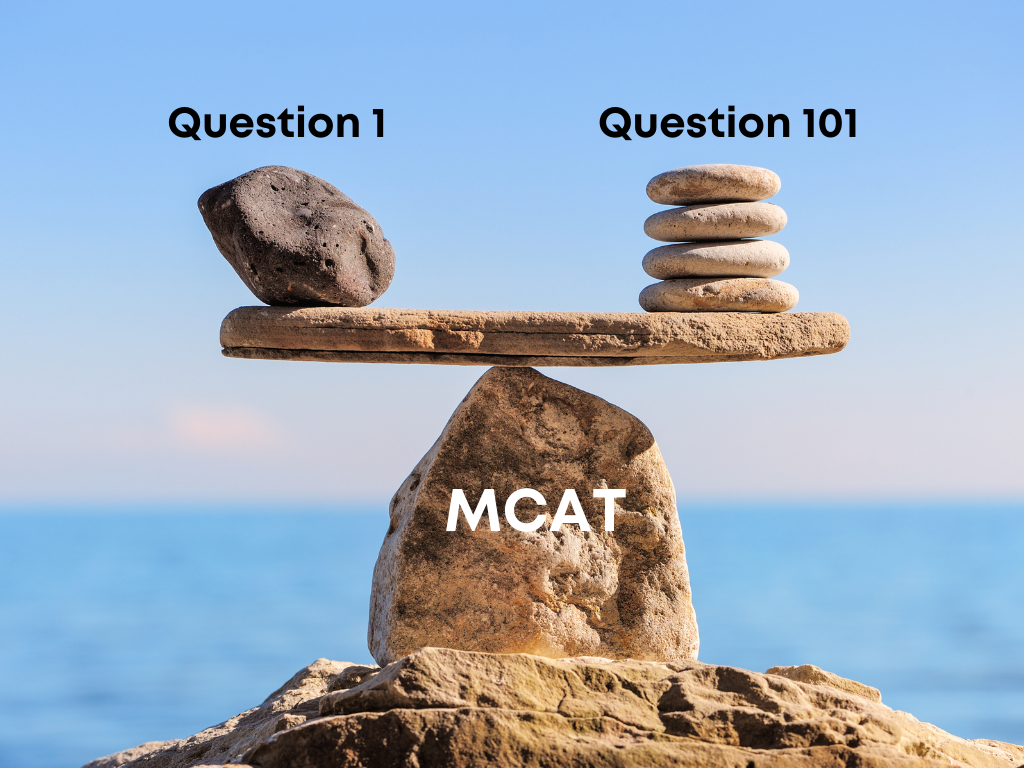
The answer is yes, with one major caveat.
Yes, every scored question is worth the same; there’s no weighting process that gives more credit for harder questions than easier ones, and there’s no partial credit. There’s also no penalty for guessing, unlike some exams you may have taken in the past. However, note our specification of scored questions here!
Each section also contains some unscored questions, called field test questions, that don’t contribute to your score at all. The AAMC uses these questions for testing purposes and, if the results fit the AAMC’s statistical requirements, they may be used again on a future MCAT. There’s no way to know how many of these questions there are, and there’s no way to know which questions are field test questions.
So why does this matter?
Well, there are three key reasons. First, the existence of these questions means that it’s effectively impossible to gauge your score before you receive it based on how many questions it feels like you’ve missed. I have to confess that this is a psychological trap I tend to fall into myself.
“The first passage is easy, so I’m feeling good so far, don’t think I missed any questions...oh no, here’s one that I have no clue on, so that’s at least one question missed....shoot, here’s another…” and so on.
This thought process is unproductive, but given that some or all of the questions you think you missed might not impact your score at all, it’s not worth worrying. A more relevant point is that field test questions mean that you shouldn’t panic if a question seems totally out of left field.
This happens frequently on the real MCAT, perhaps most noticeably in the psych/soc section. So, if you see a question and initially think “What on earth are they talking about? Did I somehow forget to study this?!”, keep in mind that it might be an unscored field test question, and don’t let it throw off the rest of your performance on that section.
How Can I Improve My MCAT Scores?
Before we conclude this guide on MCAT scores, we’d like to introduce you to the ultimate study weapon for maximizing those scores: Brainscape’s collection of 4,200+ digital MCAT flashcards.

Compiled by lead author Clara Gillan—a 100th percentile MCAT taker and the Director of Product at MedSchoolCoach—these flashcards are a powerful and efficient tool for helping students onboard the vast amount of information required to ace the exam, while also investing time every day into reviewing the content already covered.
With this awesome collection, you get:
- 4200+ dynamic flashcards with in-depth coverage of every MCAT science subject.
- A step-by-step guide to setting your MCAT study schedule.
- Top-notch psychology, sociology, and biochemistry content (recently updated).
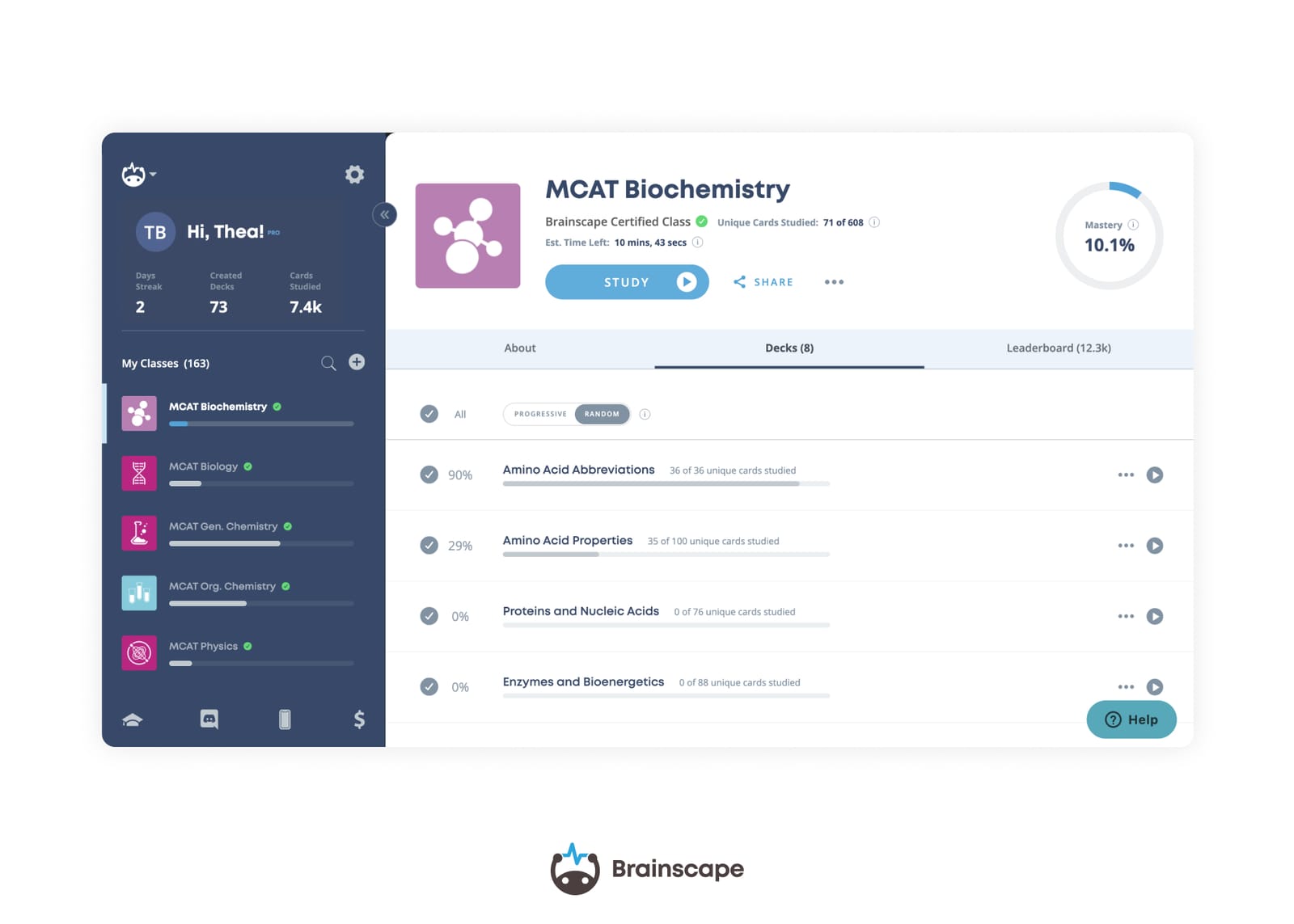
- A special focus on high-yield topics such as experimental design, analytic techniques, amino acids, and many more.
- Guaranteed coverage of all AAMC topic areas, cross-referenced with the AAMC official outline.
- An MCAT expert-designed tiered system, which progressively tests each topic from simple definitions to the most complex examples and applications, mirroring how the material appears on the real exam.
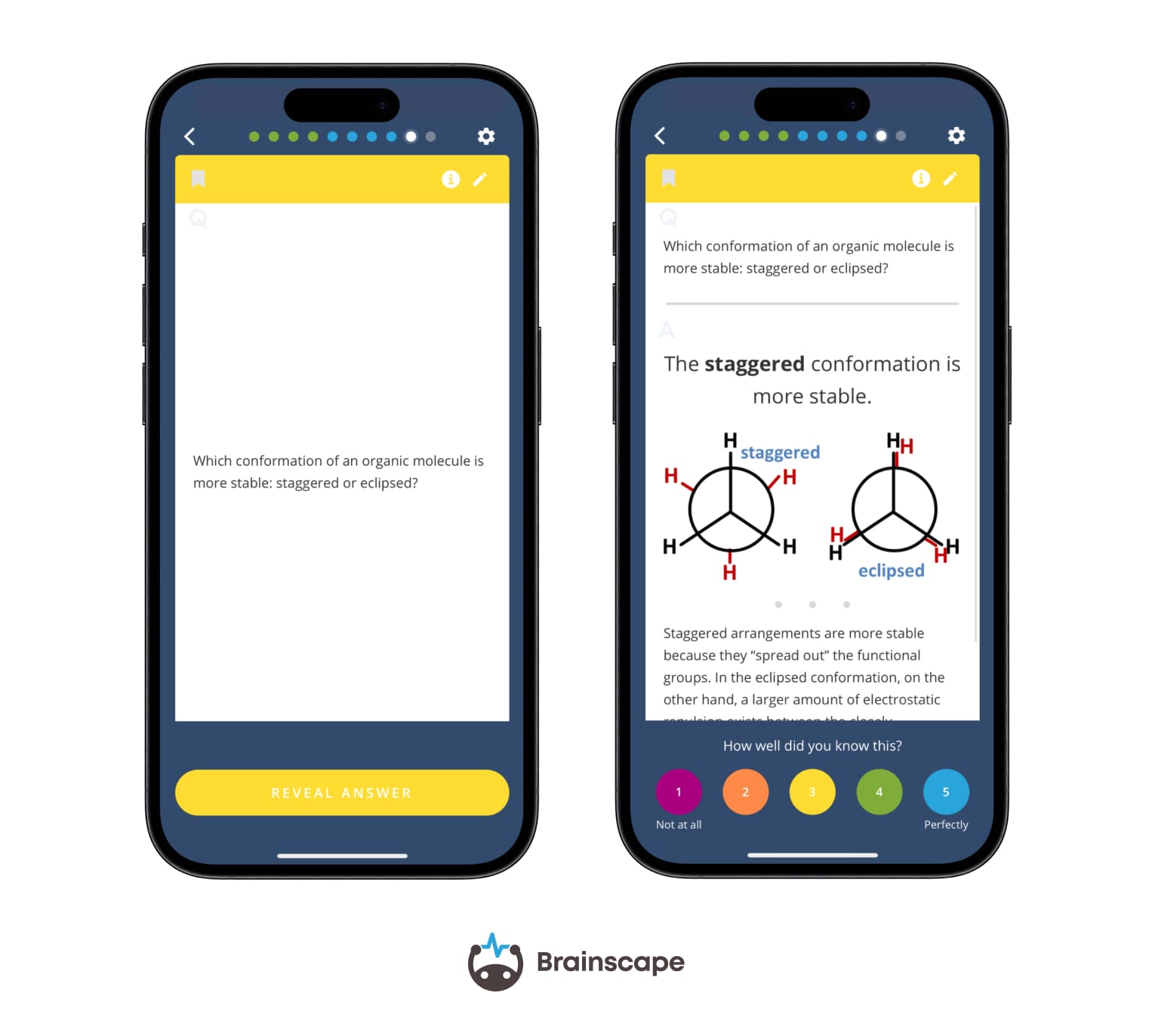
- A customized flashcard repetition algorithm that cuts your memorization time dramatically.
- Ongoing feedback, statistics, and visualization tools to help you track your progress.
- Additional guides for your MCAT prep.
With Brainscape in your corner during your MCAT prep, you’ll be well on your way to medical school!
A Final Word
Okay, that was probably more than you ever wanted to know about MCAT scoring—but understanding how your score is calculated can save you time, reduce stress, and help you put your practice results into perspective.
The MCAT is tough, but with the right preparation, you can master it. So grab the best tools available, stay focused, and arm yourself with Brainscape—your ultimate study weapon.
